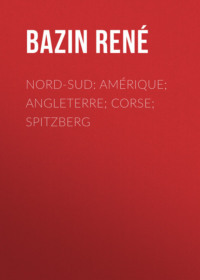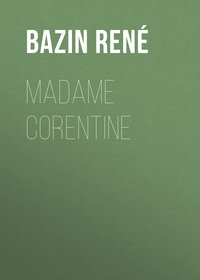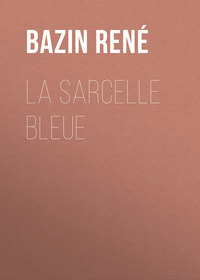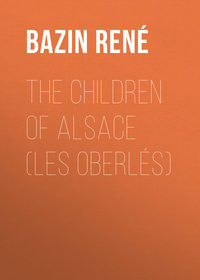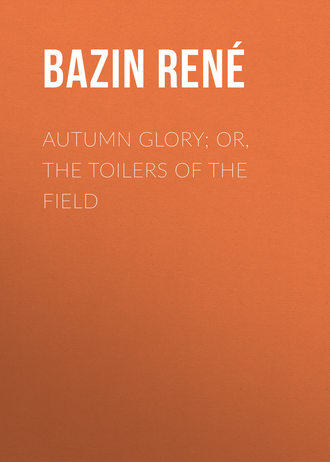 полная версия
полная версияAutumn Glory; Or, The Toilers of the Field
At that time of the year, before autumn rains had set in, many of the farms could be reached on foot without the aid of boats. A raised path, rough and ill-kept, flanked by dykes on either side, led across the meadows; grey-green grass covered the level plain until the uniform tint dissolved in brownish hue in the distant horizon. Horses grazing, stretched out their necks, and looked at the little group clad in black and white, breaking the continuity of grey-green plain. Ducks, at the sound of their footsteps, ran in among the rushes that trembled on the edge. From time to time a shelving embankment branched off the path, and one of the girls, separating from the group, would make her way by it to some distant house, only marked by the customary cluster of poplar-trees; and Félicité Gauvrit, roused for a moment from her abstraction, would say "Good-bye," and then walk on silently as before.
Soon she was left alone on the path that stretches to the sea. Then slackening her pace, she gave herself up without restraint to her thoughts. She was not happy at home. At sixty-five her father had married again a woman of thirty of loose character, whom he had met at Barre-de-Mont, and to whom in virtue of her youth he had made over the most realisable part of his property. The young stepmother was not kind to Félicité. One reproached the other with extravagance and ruining the home. The eldest brother, in the Customs at Sables d'Olonne, a gambler and hard drinker, was perpetually threatening the old man with a summons for falsified accounts, and by thus intimidating him drained still further the diminished capital of the Gauvrits. The old family, once so respected in the Marais, was rapidly declining, and this Félicité knew too well. The young men of Sallertaine and the neighbouring parishes came readily enough to dances at La Seulière; they danced, drank, joked with her, but not one of them offered to marry her. The impending ruin, the family divisions, kept suitors away.
Yet another reason, more real, and one that appealed more strongly to sentiment than any other, held back the sons of farmers, and even farm-labourers from asking the hand of Félicité Gauvrit in marriage; and this was the tie, binding only in honour, the debt of fidelity, rendered even more sacred by misfortune, which public opinion obstinately maintained as still existing between La Seulière and La Fromentière. In everybody's opinion Félicité Gauvrit remained one of the Lumineau household; a girl who had not the right to withdraw her betrothal promise, and who was not to be sought in marriage by any other while Mathurin was living. Some men even had a superstitious dread of her; they would have been afraid to set up housekeeping with a girl whose first love had met so unhappy a fate. All the advances she had made had come to nought. Soured and embittered, in her rage she had gone so far as to regret that the cripple had not been killed on the spot. Had the poor wretch, who was scarcely to be called living, died then and there, she would have recovered her liberty, the past would have been quickly forgotten; while now, it was kept in everyone's memory by the sight of the maimed man on crutches, hanging about the farmstead of which he should have been master. She had found that Death is sometimes long in claiming its victims. Then courage had returned; in her astuteness Félicité had recognised that public opinion holding her as belonging to the Lumineau family, by them only could she realise her ambition: to go away from La Seulière, escape the domination of her stepmother, and become the mistress of a large farm, with more means and freedom than ever she had possessed at home. Never having loved her former betrothed, actuated only by vanity, as is sometimes the case in country surroundings, she had said to herself:
"I will bide my time. I will make them long the more for me by not going to La Fromentière. One day Mathurin will come to me, or will call me to him. I am positive that he has not forgotten me. Stupid of him; but it will help my ends. Thanks to him, I shall see them all again; the old man who mistrusts me, the young men who will admire me for my beauty. And I shall marry either François or André, and shall be the mistress of a farm as I ought to be, and of the richest farm in the whole parish."
Now François, whom she had tried to captivate, had gone away. But, on the other hand, Mathurin had come to her; at the cost of terrible fatigue and suffering he had dragged himself to Sallertaine to greet her publicly; while André, before all the girls, had said: "It is an age since I saw you. You are not a bit altered."
Félicité had gathered one of the yellow irises that grew so profusely on the Marais. Half laughing she thought over her recent triumph, the iris lightly held between her lips; her arms swinging as she walked caused the full sleeves to rustle against the moiré of her apron; her smiling gaze was directed to the distant meadows. She was thinking that André would make a handsome husband, better looking than ever Mathurin had been; that, after all, he was one year younger than herself, that he had engaging manners, and had not been wanting in audacity either to have said: "You have not altered." And she went on to think: "The first opportunity that offers, I will invite them to a dance at home. I am sure that André will come."
Slowly she walked along the raised path in the burning rays of the mid-day sun. Grasshoppers were chirping; every now and again the acrid scent of fading rushes was in the air. Wholly absorbed in her daydream, Félicité Gauvrit did not perceive that she had nearly reached home. The white buildings of La Seulière, standing out in the meadow, came as an unwelcome surprise. At the same moment a doubt crossed her mind, disturbing, unbidden ending to her dream. Suppose André too were to go away? Or that Mathurin, elated as he was sure to be by the least sign of remembrance, and made thereby more eager, more jealous, were to guess what was in the wind?
Félicité had stopped in the middle of the bridge that led from the path to the farm. The tall, supple young woman raised her arms above her head, scowled impatiently, and snapped the stem of the yellow iris, which fell prone into the dyke, then following it with her eyes for a second, she looked at her own reflection in the water, and smiled again. "I shall succeed," she said. And descending the slope of the bridge she reached La Seulière by the cross road.
CHAPTER IX.
THE CONSCRIPTS OF SALLERTAINE
The afternoon of that autumn Sunday was marked by a deeper peacefulness than usual. The air was warm, the light veiled, the wind, which, rising with the tide, had outstripped it, sweeping over the vast grassy plain, brought no sound of work in its train, no creak of plough, no ring of hammer, spade, or axe. The bells alone were heard answering each other from Sallertaine, Perrier, Saint Gervais, Chalons with its new church, vast as a cathedral, and Seullans hidden among the trees on the hill. Chimes for High Mass, ringing for Angelus, the three strokes for vespers left the bells but little rest; far and near they told out the familiar tones, understood for centuries past. Adoration of the Holy One; forgetfulness of earth; pardon for sin; union in prayer; equality of all men in the light of eternal promises. The tones rang out into space and interlocked with a vibration, and were as garlands flung from one belfry to another. Among the toilers of the fields, cattle drivers, sowers, there were but few who did not obey the summons. Along roads deserted all the week were to be seen families hastening, passing and repassing one another, of those who lived at the remotest portions of the parish; while those who lived nearer took it more leisurely. On the canal, which, broadening at the foot of the church, forms the quay of Sallertaine, boats were constantly moving hither and thither.
Towards evening the bells had ceased; the frequenters of inn parlours too had betaken themselves to their farms, lying peacefully in the light of the setting sun. Universal silence reigned over the land. Quiet as it was on working-days, at the close of the week it seemed sunk in meditation and silence; dominical truce that had its great significance, when weary souls refresh themselves, and whole families unite in calm and meditation to review their living and their dead.
But to-day the quiet was to be of short duration.
Mathurin and André were lying under the shade of the elms that afforded provisional shelter to the harrows and ploughs close by the old stonework gateway. The cripple, leaning against the cross-bars of a harrow, was resting after the fatigue and excitement of the morning. André, from concern for him, had not gone into town again with his father, but lying at full-length on the grass was reading the paper aloud, pausing every now and then to make his comments on the news, and, as a travelled man, to explain the whereabouts of places and countries – Clermont Ferrand, India, Japan, the while twirling his little fair moustache, a very youthful and ingenuous self-sufficiency showing itself in his frank, merry face. At about four o'clock, to the left of Sallertaine, was heard the sound of a bugle, coming apparently from the open marsh between the parishes of Lumineau and Seullans. Mathurin roused from the torpor into which he had sunk, looked at André, who at the first sound of the bugle had let fall the paper, and with uplifted face and straining ears was listening to the call.
"It is the cadets," said his brother, "they are out this afternoon. Soon they will be leaving."
"They are playing the call of the 'Chasseurs d'Afrique,'" returned André, a light in his eyes. "I recognise it. Is there anyone of our old regiment in the Marais?"
"Yes, the son of a gooseherd in Fief; he served his time with the Zouaves."
They were silent, both men listening to the bugling of the ex-Zouave, their thoughts very different. André with eyes fixed on the distant marshland was seeing in imagination a white town, with narrow streets, and a troop of horsemen emerging from a crenulated gateway, its arches echoing with the ring of their horses' hoofs.
Mathurin, watching the expression on his brother's face, thought: "His heart is still with the regiment." For an instant his features distended, his eyes dilated as those of a wild beast detecting its prey, then he returned to his one idea.
"Driot," he exclaimed after a while, "you like that music?"
"I should think so."
"Do you regret the regiment?"
"No, that I don't. No one does."
"Then what was the attraction out there?"
The young man looked inquiringly into his brother's face as though to say, why should he want to know, then answered:
"The country – Hark! that's the reveille now."
The sounds of the bugle, sharp, incisive, stopped. Now five or six strong untrained voices struck up "Le chant du départ." Occasional words reached the listeners where they lay. "Mourir pour la patrie … le plus beau … d'envie." The rest was lost in space.
Meanwhile the sounds were approaching; the two brothers motionless under the elms, each pursuing the train of thought evoked by the first notes of the bugle, could hear the conscripts of Sallertaine coming up the hill towards them.
Toussaint Lumineau, on his way home from vespers with his friend Massonneau, heard them also. Massonneau, an old tenant farmer, tall and thin, with skin as dark as a ripe ear of corn, the cartilages of his neck standing out like the breast-bone of a fowl, had acquired his name of "Le Glorieux" from a nervous twitch he had, which caused his chin to jerk upwards at every instant; Lumineau and he were discussing the latest events of La Fromentière. The two men represented the age and wisdom of the Marais; moreover, they could tell the names and nicknames of every living soul at Sallertaine, their history and parentage. As they reached the last houses of the town, both simultaneously stopped and turned their faces windward.
"Do you hear, Glorieux?" exclaimed Lumineau. "They are bugling and singing, poor boys! But the parents of those who are going may well weep."
"Yes," returned Massonneau, with a twitch of the chin, "the parents are to be pitied."
"I could name them, everyone, from only hearing their lad's voices," continued Lumineau. "You, good people of La Bounellerie, and you, of Grand Paiement; you, of Juch-Pie; you, of Linotteries; and you, of Belle-Blanche, I recognise your boys' voices. May it not do the same work for them that it did for my François! They are going to the place that changed my boy's heart – to the town that robbed me of him."
"As it robbed La Pinçonnière," said his companion.
"And Leverells."
"And Parée-du-Mont."
The litany might have been prolonged; Massonneau hearing the voices at the edge of the Marais broke in with:
"They are singing again," he said, "they are going up the hill to you, Lumineau."
And in truth the young conscripts had begun the ascent towards La Fromentière; soon the bugle call, soon their voices, resounded over the silent Marais, carried afar by the wind, like grains of seed falling everywhere. And everywhere, without apparent reason, emotions were stirred, old sorrows awoke, and the humble occupants of isolated farms or remote villages listened with a tightening of the heart to the tramp of the conscripts of Sallertaine.
As they reached the meadow-land of La Fromentière, Mathurin, who had been following the sounds, and with his marvellous sense of observation had marked every step of their way, said to André:
"They have already halted at three farms. I think they must be collecting for their class. You did not do that? For the last two years they have started calling at all the houses where there is a young girl of their own age, to ask her for a fowl as compensation for having to serve. Rousille is drawn among the other girls. You should catch a fowl to give them when they come."
"So I will," returned André, laughing and springing up with a bound. "I'm off. What do they do with all the fowls?"
"Eat them. They get three or four farewell dinners out of them. Be quick! they are coming!"
André disappeared within the courtyard. Soon could be heard his merry laugh, and a rush in the direction of the barn, then the terrified cries of the fowl he had evidently caught; and soon he reappeared holding his prize by the legs, its round spotted wings, grey and white, rising and falling on the grass as he walked. At the same moment a blast on the bugle was heard at the foot of the dwarf orchard; Mathurin half-raised himself upon the harrow, his hands clasping the cross-bars, his arms extended, his shaggy head bent forward, awaited the arrival of the troop, André standing beside him. Opposite them, just at the opening of the road leading down to the Marais, the setting sun, an enormous ball tinted orange by the mist, filled the entire space between the two treeless banks.
In this sun-bathed glory three girls advanced, arm-in-arm, up the ascent, the tallest in the middle; all were dressed in black with lace coifs; the jet on their velvet kerchiefs sparkling in the light. As they walked they rhythmically swayed their heads; they were girls from Sallertaine, but the light was behind them, and only Mathurin could recognise in the centre one Félicité Gauvrit. A few paces in the rear came the bugler, a standard-bearer, and five young men walking abreast, carrying either in their arms or suspended from a hempen cord the fowls collected from the farmhouses. The procession advanced some hundred yards along the road, then pulled up between the elms and the ruined wall of La Fromentière.
"Good day, brothers Lumineau!" said a voice.
There was a burst of laughter from the band, excited by their march and the muscadet they had drunk on the way. The cripple's hands gave way, he glanced up at André.
Félicité Gauvrit, without leaving hold of her companions, had advanced slightly in front of them, and was gazing with a pleased expression at the youngest Lumineau, who held out the grey fowl to her.
"You guessed then, André?" she said. "Ah, that's what it is to have to do with intelligent boys. Here, Sosthene Pageot, come and take Rousille's fowl."
A sturdy lad with ruddy face, and the stupefied air of one beginning to feel the effects of drink, stepped out from among the others and took the fowl. But from the mocking attitude of André, and his studied silence, Félicité guessed that he was surprised to see a girl of her position in such company, therefore she added carelessly:
"You may be satisfied that I do not range the Marais every day with conscripts. My doing it to-day is out of kindness. My two friends here, who belong to the class, were called upon to go the round to collect; they are shy and dared not go alone, and so it must have been given up, had I not come to the rescue." She expressed herself well, with a certain refinement that came with the habit of reading.
"That would have been a pity!" said the young man coldly.
"Yes, would it not? The more so, that I am not often seen in your part of the world."
She turned her head towards the windows of La Fromentière, the stables, the hayricks, sighed, then immediately remarked in a playful tone:
"You will come to one of our dances, will you not, André? The Maraîchines hope so."
At this there were signs of approval to the right and left of her.
"Perhaps," replied André. "It is so long since I was at a dance in Sallertaine; inclination may return."
She thanked him with a knowing wink; then for the first time seemed to be aware of the presence of Mathurin, who was looking at her with an air of mingled passion and grief.
A look of pity and embarrassment, not altogether feigned, came into her face as she said:
"You understand, Mathurin, what I say to one I say to all in your house… If it were not too fatiguing for you?.. I was glad to see you at mass again this morning … it shows that you are feeling better…"
The cripple, only able to express himself clearly when he had time to think over his words, stammered out:
"Thank you, Félicité … you are very kind, Félicité," and he uttered her name with a kind of adoration that seemed to touch two or three of the conscripts, stupefied as they were.
"What was your regiment, Mathurin?" asked the standard-bearer.
"The third Cuirassiers."
"Bugler, a fanfare of the Cuirassiers in honour of Mathurin Lumineau! Forward, march!"
The three girls, the bugler, the standard-bearer, and the five young men bringing up the rear, left the shade of the elms, and went on their way towards Quatre-Moulins, raising clouds of dust crossed by the slanting rays of the sun. The fanfare shook the walls of the old farmhouse.
When the last lace coif had disappeared among the furze-bushes and willows that bordered the road, Mathurin said to his brother, who had taken up the paper again and was absently reading:
"Would you believe it, Driot, this is the first time for six years that she has been here!"
André replied, too abruptly:
"She did for you once, old man. Better take care that she does not do it a second time."
With muttered words of anger Mathurin Lumineau picked up his crutches, and moving away to a little distance, leant up against a tree. The two brothers spoke no more to each other; both were absently gazing out over the marshland, where the daylight was dying away. The sun was rapidly sinking in the lowland, only a red crescent broken by shadows remained of the fiery globe, against which some dark object in the horizon, a willow, or a group of rushes, stood out like a crown of thorns. It faded away; a fresh breeze rose on the hills; the sounds of the bugle and of voices were no longer heard. Profound silence was over the country, here and there in the grey distance was the glimmer of a fire. Peace had returned; sorrows, one by one, were ending in sleep or in prayer.
Old Lumineau coming back from the town saw his two sons standing motionless among the trees wrapt in contemplation of the quiet scene, and not knowing their thoughts, said brightly:
"A fine sight, our Marais, eh, boys? Now let us go in together; supper will be waiting." Then as, in the darkness, André came first, he added:
"How glad I am to have you home again from the regiment, my Driot!"
CHAPTER X.
THE UPROOTED VINEYARD
Winter had come. La Fromentière seemed peaceful and happy. Anyone going over the fields and watching the men at work, would have had no fear for the future of the farmstead. The new farm-hand did not excite himself, as Toussaint Lumineau said, that is to say, he worked his fourteen hours a day regularly, without uttering fourteen words. As for André, he was the joy and pride of his father, who, on his part, did not spare himself. Good labourer, good sower, an early riser, careful of the animals and of everything else that came to his hand, the young man seemed to prove that he had found his vocation, and was determined to remain a farmer all his life.
And yet at the bottom of his affectionate, restless heart, there was a growing sore. André could not accustom himself to François' absence. He missed the friend of his young life, the companion without whom La Fromentière had never presented itself to his mind.
The week after his return home, André had gone to see François and Eléonore at La Roche-sur-Yon. He had found them settled in a house in the outskirts, already somewhat discontented: one inveighing against the hardness of his employers; the other that customers did not come; without any regrets, however, for what they had done, and quite decided as to the advantages of living in a town, and being their own masters. He had gone back without the least wish to follow their example – more severe even than before against the renegades from the old home life; but possessed of a fixed idea, he sought François in everything. La Fromentière that knew François no longer was to him empty and void. It became a thing of which he could not shake himself free; a suffering of which he never spoke, but that everyone unwittingly renewed.
The farmer, whose anger had abated, more particularly since he knew that the position of his two absent children at La Roche was none too brilliant, began voluntarily to speak of François as if to secretly encourage the others to remember him, and to do their best to bring him home again. It would be: "To-day we will sow La Cailleterie, where François ploughed the first two furrows," or, "let us have some chestnuts roasted in the embers to-night, Rousille, François used to like them." He thought to do well by so speaking, to re-unite, as it were, in some degree those whom misfortune had parted. And Rousille did the same. Still oftener did everyday objects speak of, and recall the absent one. Now it was a fork he had been wont to use; a basket woven by him; the rope twisted round a rafter of the stables by a hand no longer there; or even a nook or corner of a road or field to which some memory clung; the stump of a tree; a furze-bush; in fact, the whole Marais, where for years two boys of almost the same age, brothers inseparable, had driven the cows, jumped dykes, and gone birds'-nesting together.
Poor François, lazy, spendthrift, pleasure-loving as he was in reality, legendary virtues were already gathering round him at La Fromentière. His place in the diminished family was reserved to him with tender, affectionate regret, a regret that even magnified what had been his place there. André, disheartened, and disappointed in the joy of home coming, had not the same love for the new La Fromentière that he had had for the old one. It was all so changed! He had known it bright with the noise and bustle of a large, united family under the control of a man who, despite his years, was cheery and vigorous, and with more willing hands than were needed to get through the day's work – a home as passionately loved and defended as any nest from which the fledgelings have not yet flown. He found it unrecognisable. Two had gone, leaving the house desolate, the old father inconsolable, the work too heavy for those left behind. Rousille was wearing herself out. André saw clearly that he alone would not suffice to keep La Fromentière in a state of good cultivation, certainly not to improve it, as he had so often meditated through the hot, sleepless nights in Africa, thinking of the elm-trees at home. For this two strong young pair of arms were needed, without counting the help of a farm-servant: François should have been there with André! He struggled against the discouragement that oppressed him, for he was a brave lad. Every morning he went out into the fields with the determination to work so hard that there should be no room for thought; and he worked and ploughed, sowed seed or dug ditches, planted apple-trees with all zest and energy, not taking a moment's rest. But the recollection of François followed him everywhere; in everything he saw the decline of the farmstead. Working alone made the days long; longer still were they in the company of the new farm-hand, who went about his work stolidly, interested neither in the projects nor regrets of the farmer's son.




